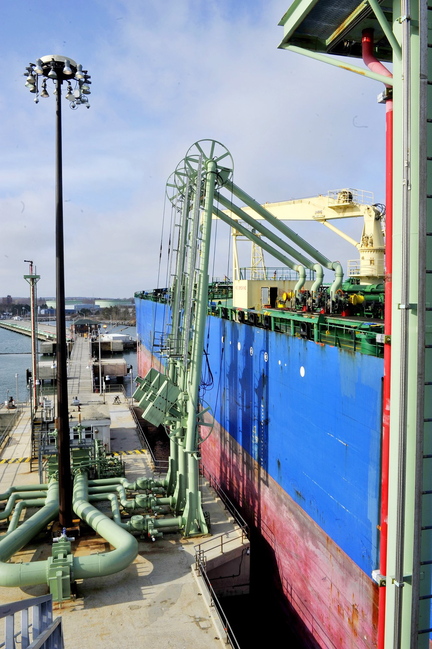Portland Pipe Line Corp. has surrendered a permit it would have needed to reverse the flow of its 236-mile underground pipeline and bring in so-called tar sands oil from Canada to South Portland’s waterfront.
The unusual step is a direct response to the company’s critics, who pointed to the environmental permit as proof of an impending project despite Portland Pipe Line’s denials of any intention to pursue one.
It also reflects the charged atmosphere of the campaign leading up to a high-stakes local referendum on the issue Nov. 5.
Although giving up the permit does not preclude the company from applying for another one in the future, Portland Pipe Line CEO Larry Wilson issued a statement Thursday calling it “one more good-faith commitment to this city that we do not have a pending or proposed, or let alone imminent, ‘tar sands’ project.”
Environmental activists say tar sands crude is especially risky because it is sticky and corrosive and its export into the global market will accelerate climate change. Spills of the oil – especially in bodies of water – have been particularly difficult to clean up.
Petroleum industry representatives say the oil poses no greater risk of leaks or spills than the crude that already flows through the pipeline.
The permit, granted in 2009 by the Maine Department of Environmental Protection and extended last year through February 2014, would have allowed Portland Pipe Line to build two 70-foot-tall vapor control units on its pier in South Portland. The units, which look like smokestacks, would have burned off vapors released during the loading of crude oil onto ships for export.
Surrendering a permit is unusual, said Jessamine Logan, spokeswoman for the DEP. She said that if Portland Pipe Line were to apply for a similar permit in the future, it would have to pay the fees again and start the approval process anew.
Edmond Bearor, who has practiced environmental law for more than two decades and is now a partner in the Bangor firm Rudman Winchell, said he has never seen such a surrender in his career.
“I can’t think of a much rarer event,” he said. “These people don’t take these decisions lightly. There were probably hours of meetings and strategizing with their lawyers and engineers.”
Since May, petroleum companies that operate in South Portland and residents who don’t want tar sands oil in the city have battled over a proposed zoning change, called the Waterfront Protection Ordinance, which would bar tar sands oil extracted in Alberta from flowing through the city.
The ordinance would strictly define the unloading of petroleum as an allowed use in South Portland’s shipyard district and limit any expansion or alteration of existing petroleum facilities that would change their function or capacity.
In the face of a public campaign against the Canadian oil, Wilson and other Portland Pipe Line officials have said there is no active pipeline reversal project.
But members of Protect South Portland, the citizens group campaigning for passage of the zoning change, have said repeatedly that they distrust the company’s claim. Until this week, they pointed to the permit as proof that the company was disingenuous in its denial.
“The opponents have raised this in their mind that this could be brought back imminently,” said Jim Merrill, a spokesman for Portland Pipe Line. “There is nothing pending. There is nothing proposed. They have surrendered this permit to the DEP.”
But with the potential for another permit application, Cathy Chapman, spokeswoman for Protect South Portland, said, “This is just another in a line of flip-flops that Larry Wilson has been doing on this issue. … He says whatever is convenient at the time.”
Chapman said her group will stop using a copy of the permit in brochures and on signs once it determines that the surrender filing is real and legitimate.
Portland Pipe Line Corp. operates an oil terminal in South Portland and a pair of underground pipes that carry crude oil from Portland Harbor to a refinery in Montreal. The terminal is one of six on the waterfront that generate about $1.6 million in total annual tax revenue, representing about 2.7 percent of the city’s tax base.
South Portland has a key deep-water port that receives products such as home heating oil, jet fuel, ethanol and other petroleum-based products and serves as a distribution point for customers in Maine, New Hampshire and beyond.
The referendum campaign in South Portland is the result of a struggle by Canadian companies to export the crude oil that has been locked up underground in a mixture of sand and water.
Oil companies have known about the vast deposits in Alberta since the 1930s, but because of the complicated and expensive process involved in its extraction and processing, the oil has previously been cost-prohibitive. The global rise in oil prices, however, puts new value on the reserves, which the Albertan government estimates at 170.8 billion proven barrels.
Matt Byrne can be contacted at 791-6303 or at:
mbyrne@pressherald.com
Send questions/comments to the editors.




Success. Please wait for the page to reload. If the page does not reload within 5 seconds, please refresh the page.
Enter your email and password to access comments.
Hi, to comment on stories you must . This profile is in addition to your subscription and website login.
Already have a commenting profile? .
Invalid username/password.
Please check your email to confirm and complete your registration.
Only subscribers are eligible to post comments. Please subscribe or login first for digital access. Here’s why.
Use the form below to reset your password. When you've submitted your account email, we will send an email with a reset code.